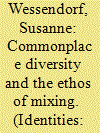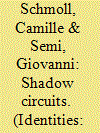| Srl | Item |
| 1 |
ID:
123189


|
|
|
|
|
| Publication |
2013.
|
| Summary/Abstract |
The London Borough of Hackney is one of the most diverse places in Britain. It is characterised by a multiplicity of ethnic minorities, different migration histories, religions, educational and economic backgrounds both among long-term residents and newcomers. This article describes attitudes towards diversity in such a 'super-diverse' context. It develops the notion of 'commonplace diversity', referring to cultural diversity being experienced as a normal part of social life. While many people mix across cultural differences in public and associational space, this is rarely translated into private relations. However, this is not perceived as a problem, as long as people adhere to a tacit 'ethos of mixing'. This comes to the fore in relation to groups who are blamed to 'not want to mix' in public and associational space. The article discusses the fine balance between acceptable and unacceptable social divisions in relation to specific groups who are seen to lead separate lives.
|
|
|
|
|
|
|
|
|
|
|
|
|
|
|
|
| 2 |
ID:
123187


|
|
|
|
|
| Publication |
2013.
|
| Summary/Abstract |
In Italy, as in other southern European countries, both the notions of diversity and multiculturalism have only recently come into use. In this article, we show how over the last 30 years two Italian cities, Turin and Naples have been transformed and reshaped by patterns of mobility and informal commerce that we have referred to as 'shadow circuits'. Shadow circuits work through the connection of distant places in Europe and the Mediterranean and contribute to the understanding of complex, stratified societies, mobile societies in particular. A mobile ethnography perspective has been carried during fieldwork and is discussed in length in this article. The examples of Turin and Naples are particularly useful because, unlike many other Italian cities, both have developed pro-multiculturalism and pro-diversity policies in the last two decades. This makes them particularly interesting case studies for addressing the gap between diversity as a policy and diversity as a social fact.
|
|
|
|
|
|
|
|
|
|
|
|
|
|
|
|